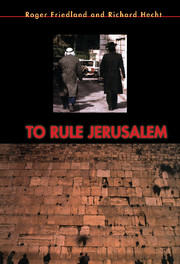Book contents
- Frontmatter
- Contents
- List of Illustrations
- Preface
- Acknowledgments
- Introduction
- 1 A Fearful Fusion
- Part I The Two Zions: Jews Against Zionism in Jerusalem
- 2 Zion Against Zionism
- 3 Black Zion
- 4 Sabbath Wars
- 5 To Control the Center
- Part II Zion Divine: Jerusalem as the Messianic Central City
- Part III Birth of a Nation
- Part IV Heart of Stone
- Notes
- Index
5 - To Control the Center
Published online by Cambridge University Press: 13 May 2010
- Frontmatter
- Contents
- List of Illustrations
- Preface
- Acknowledgments
- Introduction
- 1 A Fearful Fusion
- Part I The Two Zions: Jews Against Zionism in Jerusalem
- 2 Zion Against Zionism
- 3 Black Zion
- 4 Sabbath Wars
- 5 To Control the Center
- Part II Zion Divine: Jerusalem as the Messianic Central City
- Part III Birth of a Nation
- Part IV Heart of Stone
- Notes
- Index
Summary
Mayor Teddy Kollek entered the Persian synagogue in the Bukharian quarter with the best intentions. Attending services in a haredi neighborhood on the last Shabbat before the municipal elections wouldn't give him any votes. Many people in these neighborhoods didn't vote. And if they did, they wouldn't vote for him. This act of respect by a mayor who believes in mutual tolerance would soon become a grim reminder of the city's fault lines.
Haredi children who saw the mayor enter the synagogue told their parents. When he emerged, hundreds of young men from different anti- Zionist communities were waiting for him. What began as shouting of insults ended in mob violence. Kollek, a barrel-chested senior citizen, landed a few punches of his own. He was thrown repeatedly to the ground, kicked, spat upon, and beaten, along with others who accompanied him. For the rest of the the 1983 electoral campaign, he walked with difficulty, using a gold-tipped cane to support himself.
Moshe Hirsch, the anti-Zionist Neture-Karta activist, returned home to find police waiting to take him away. “I don't mind,” he told us, “I like to help out a fellow Jew.” Haredim had violated Shabbat's sacred time to mug the mayor. The Edah Haredit, the umbrella organization of anti-Zionist Jews, was unrepentant about the behavior of Jews who looked to them for leadership. “I am not upset about what happened,” its secretary remarked. “He is considered by us as a religion hater and a hater of Judaism. We have many unclosed accounts with him. In my opinion, he deserves more punishment than he got. Those who attacked him weren't behaving correctly because it is for heaven to judge, not man.”
- Type
- Chapter
- Information
- To Rule Jerusalem , pp. 122 - 140Publisher: Cambridge University PressPrint publication year: 1996

